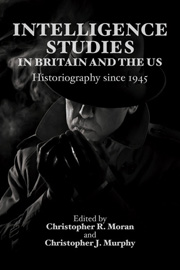Book contents
- Frontmatter
- Contents
- The Editors
- The Contributors
- List of Figures
- Preface
- Acknowledgements
- Introduction: Intelligence Studies Now and Then
- Part I AMERICAN INTELLIGENCE HISTORIOGRAPHY
- Part II BRITISH INTELLIGENCE HISTORIOGRAPHY
- 9 A Plain Tale of Pundits, Players and Professionals: The Historiography of the Great Game
- 10 No Cloaks, No Daggers: The Historiography of British Military Intelligence
- 11 The Study of Interrogation: A Focus on Torture, But What About the Intelligence?
- 12 Whitehall, Intelligence and Official History: Editing SOE in France
- 13 A Tale of Torture? Alexander Scotland, The London Cage and Post-War British Secrecy
- 14 1968 – ‘A Year to Remember’ for the Study of British Intelligence?
- 15 Their Trade is Treachery: A Retrospective
- 16 Intelligence and ‘Official History’
- Index
10 - No Cloaks, No Daggers: The Historiography of British Military Intelligence
from Part II - BRITISH INTELLIGENCE HISTORIOGRAPHY
Published online by Cambridge University Press: 05 October 2013
- Frontmatter
- Contents
- The Editors
- The Contributors
- List of Figures
- Preface
- Acknowledgements
- Introduction: Intelligence Studies Now and Then
- Part I AMERICAN INTELLIGENCE HISTORIOGRAPHY
- Part II BRITISH INTELLIGENCE HISTORIOGRAPHY
- 9 A Plain Tale of Pundits, Players and Professionals: The Historiography of the Great Game
- 10 No Cloaks, No Daggers: The Historiography of British Military Intelligence
- 11 The Study of Interrogation: A Focus on Torture, But What About the Intelligence?
- 12 Whitehall, Intelligence and Official History: Editing SOE in France
- 13 A Tale of Torture? Alexander Scotland, The London Cage and Post-War British Secrecy
- 14 1968 – ‘A Year to Remember’ for the Study of British Intelligence?
- 15 Their Trade is Treachery: A Retrospective
- 16 Intelligence and ‘Official History’
- Index
Summary
The history of military intelligence has now become almost inextricably bound up with that of intelligence generally. This is perhaps inevitable. As Sir Kenneth Strong, Eisenhower's wartime intelligence chief, put it:
Intelligence is indivisible. No area of activity – politics, economics, military affairs, science and technology – can be treated as a subject apart and treated in isolation.
Although he was making a point about the necessity of centralised intelligence management, he captures the field's inherent complexity and interdependence. In recent decades, the submergence of military intelligence can also be attributed to the higher profile of ‘civilian’ intelligence, especially of collection agencies, within Western popular culture. In Britain, the public automatically associate the MI prefix with the Security Service (MI5) and the Secret Intelligence Service (MI6), even though both organisations have long ceased to be closely connected to the military. But it is not for this chapter to analyse British intelligence history as a whole. Instead, this chapter will attempt to disentangle the historiography of British military intelligence from the whole, and, in so doing, will try to suggest why it now has a low profile. The chapter will also offer a survey of the current literature, in the hope that this may be helpful to new scholars of the subject. This body of work has been largely focused on the pre-1945 period, so that date has been adopted as a de facto cut-off point.
- Type
- Chapter
- Information
- Intelligence Studies in Britain and the USHistoriography since 1945, pp. 202 - 221Publisher: Edinburgh University PressPrint publication year: 2013

